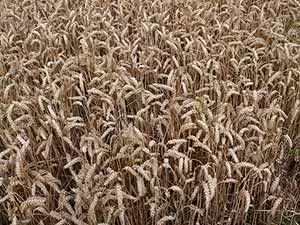Celiac.com 03/27/2013 - Increased rates of celiac disease over the last fifty years are not linked to wheat breeding for higher gluten content, but are more likely a result of increased per capita consumption of wheat flour and vital glutens, says a scientist working with the US Department of Agriculture (USDA).
 The researcher, Donald D. Kasarda is affiliated with the Western Regional Research Center of the U.S. Department of Agriculture's Agricultural Research Service.
The researcher, Donald D. Kasarda is affiliated with the Western Regional Research Center of the U.S. Department of Agriculture's Agricultural Research Service.
Celiac.com Sponsor (A12):
Kasarda recently looked into one prominent theory that says that increased rates of celiac disease have been fueled by wheat breeding that has created higher gluten content in wheat varieties. His research article on the topic appears in the Open Original Shared Link.
Kasarda says that, while increased consumption of wheat flour and vital wheat gluten may have contributed to the rise in celiac disease over the last decades, "wheat breeding for higher gluten content does not seem to be the basis."
He notes that vital gluten is a wheat flour fraction used as an additive to improve characteristics like texture, and commonly featured in numerous and increasingly popular whole wheat products. However, he says that there is a lack of suitable data on the incidence of celiac disease by year to test this hypothesis.
Part of his article features statistics on wheat flour consumption throughout the two centuries. He notes wheat flour consumption from all types of wheat hit an all-time high of 220 pounds per person (100kg) in 1900, declined steadily to a low of around 110 pounds per person (50kg) in 1970, then gradually rose to about 146 pounds per person (66kg) in 2000, and then decreased to about 134 pounds per person (61kg) in 2008.
He goes on to point out that, even though consumption of wheat flour "seems to be decreasing slightly in recent years, there was an increase in the yearly consumption of wheat flour of about 35 lb (15.9kg) per person in the period from 1970 to 2000, which would correspond to an additional 2.9 lb (1.3kg) of gluten per person from that extra flour intake."
Kasarda suggests that 'crude estimates' indicate that consumption of vital gluten has tripled since 1977. He finds this fact very interesting, because, he says, "it is in the time frame that fits with the predictions of an increase in celiac disease."
However, he says that attributing an increase in the consumption of vital gluten directly to the rise of celiac disease remains challenging, partly because consumption of wheat flour increased far more significantly in the same time frame.
Additionally, Kasarda says that there is no evidence that farmers have been breeding wheat to ensure higher protein and gluten content over the years. He points out that numerous studies have compared the protein contents of wheat varieties from the early part of the 20th century with those of recent varieties. These studies have all shown that, "when grown under comparable conditions, there was no difference in the protein contents," he said.
One factor that remains unanswered is the relationship between higher rates of celiac disease and higher rates of diagnosis. That is, are more people developing celiac disease, or are more people simply with celiac disease getting diagnosed than in the past?
It's likely that more and more people with celiac disease are being diagnosed, but it's unclear whether celiac disease rates are rising. There is just not enough evidence yet to provide a solid answer, although studies in the US and in Finland suggest that rates of celiac disease may be on the rise.
Kasarda's article points out how much more research needs to be done. We need to determine if there is, in fact, a genuine rise in celiac disease rates and, if so, how such a rise might relate to gluten consumption.
For now, though, there just isn't any solid evidence that wheat has any higher gluten levels than in the past, or that gluten consumption is driving an increase in celiac disease levels.
What do you think? Have you heard this theory about modern wheat having higher gluten levels, or being substantially different than wheat in the past? Have you heard that such a difference may be driving higher rates of celiac disease? Please share your comments below.
Source:
- Open Original Shared Link






Recommended Comments